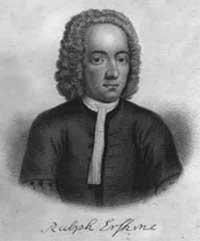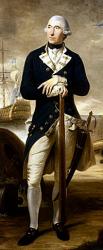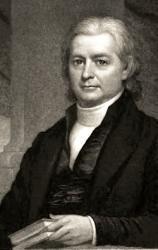Planning worship?
Check out our sister site, ZeteoSearch.org,
for 20+ additional resources related to your search.
- |
User Links
Person Results
‹ Return to hymnal



Export as CSV
John Blain
1795 - 1879 Hymnal Number: d366 Author of "My dearest friends in bonds of love" in The Ebenezer Selection of Hymns and Spiritual Songs, with an appendix Consisting of Miscellaneous Pieces. 6th ed. Blain, John. (Fishkill, New York, February 14, 1795--December 26, 1879, Mansfield, Massachusetts). Baptist. Studied at Fairfield (New York) and Middlebury (New York) academies. Pastored for nearly sixty years in : Auburn, New York City, York, and Syracuse, New York; Pawtucket and Central Falls, Rhode Island; New London, Connecticut; Charlestown and Mansfield, Massachusetts. He was also an evangelist and baptized about three thousand persons. He gave large sums to missions while living, and willed his property to home and foreign missions.
The one hymn for which Blain is remembered is a parting hymn written in 1818, and published in the Original and Selected Reformation Hymns and Spiritual Songs (1829). Comprising twelve stanzas, the hymn begins:
My Christian friends in bonds of love,
Whose hearts in sweetest union prove;
Your friendship's like a drawing band,
Yet we must take the parting hand.
A part of this hymn, altered by Rev. H.L. Hastings, later appeared in Songs of Pilgrimage (1886).
Paul R. Powell (?), DNAH Archives
John Blain
Ralph Erskine

1685 - 1752 Hymnal Number: d264 Author of "In heavenly choirs a question rose" in The Ebenezer Selection of Hymns and Spiritual Songs, with an appendix Consisting of Miscellaneous Pieces. 6th ed. Erskine, Ralph, was son of Henry Erskine who was Rector of Cornhill, Northumberland, before the Act of Uniformity in 1662, and after the Revolution of 1688 was Parish minister of Chirnside, Berwickshire. He was born at Moneylaws, Northumberland, March 15, 1685, his father being then in exile from Scotland for taking part in conventicles. He entered the University of Edinburgh in 1699, was licensed to preach in 1709, in 1711 ordained second minister of the Abbey Church, Dunfermline, and became first minister in 1716. Joining in 1737 with the "Four Brethren," who, protesting against the action of the General As¬sembly on Patronage, had been loosed from their charges by the Commission in 1733 and had formed themselves into a Presbytery at Gairney Bridge, near Kinross, Dec. 5, 1733, thus founding the Associate Church, he was with them and three others cited to, and de¬posed by, the General Assembly of 1740. In 1740 the majority of his congregation seceded with him and built him a church in Queen Anne Street, Dunfermline, in which he continued to minister till his death. He did not, however, cease to preach in his turn in the Abbey Church till after May, 1742. He died at Dunfermline, Nov. 6, 1752.
His published works are included in his Sermons and other Practical Works (Glas. 1764-1765), the complete folio ed. in 2. vols. ed by John Newlands (his son-in-law), contains a short memoir, 141 sermons, and (1) Gospel Sonnets: or, Spiritual Songs . These Gospel Sonnets, of which the 2nd and complete ed. appeared in Edinburgh, 1726, and the 5th finally revised, in London, 1741, though homely, enjoyed great popularity, and did much good in Scotland in the last century. (2) A Paraphrase upon the Song of Solomon. In this, first published in Edinburgh, 1736, the "Song" is spiritualized at great length. (3) Scripture Songs. These are in 2 Books. The Old Testament Songs are (i.) 14 Songs from Genesis to Job; (ii.) Job's Hymns, 100; (iii.) The Song of Solomon, complete ; (iv.) 21 Songs from Ecclesiastes, Isaiah, and Jeremiah; (v.) Lamentations, complete; (vi.) 6 Songs from the Minor Prophets. The New Testament Songs are (i.) 17 Songs from the Gospels; (ii.) 24 Songs from the Epistles; (iii.) 16 Songs from the Revelation. Of these parts the 2nd (Glas., 1753), the 3rd (Glas., 1752), and the 5th (Glas., 1750), the Old Testament, were the first published separately. The remainder, published at Glasgow, in 1754 as Scripture Songs, in 3 Books, were undertaken by request of the Associate Synod, in 1748, but not being published before Erskine's death never came into Church use. Many are altered from Watts, and some from the Translations and Paraphrases of 1745. (4) Miscellaneous Poems. These include 3 English and 2 Latin Elegies, a poem on the Civil Magistrate and Religion, and 7 Epitaphs. Smoking Spiritualised is given at the end of the Gospel Sonnets. A number of pieces by Erskine were included, more or less altered, in the Moravian hymn-books. The only one found in a modern hymnal which is well known is annotated under, "Ah! mournful case, what can afford," and another not now in common use under “Aurora veils her rosy face." [Rev. James Mearns, M.A.]
-- John Julian, Dictionary of Hymnology (1907)
Ralph Erskine
Richard Kempenfelt

1718 - 1782 Hymnal Number: d75 Author of "Burst, ye emerald [pearly] gates, and bring" in The Ebenezer Selection of Hymns and Spiritual Songs, with an appendix Consisting of Miscellaneous Pieces. 6th ed. Kempenfelt, Richard, of Swedish descent, was born Oct., 1718. In Jan., 1741, he obtained a lieutenant's commission in the British Navy. He became captain in 1757, and admiral in 1780. He was drowned in the "Royal George," which sank in harbour at Portsmouth on Aug. 29, 1782. Admiral Kempenfelt was an admirer of Whitefield and the Wesleys, and interested himself much in evangelistic work. His hymns were published as Original Hymns and Poems. By Philotheorus. Exeter, printed by B. Thorn, 1777, and were dedicated "To the Rev. Mr. Fletcher, Vicar of Madeley, in Shropshire." They were reprinted, with a Preface, by D. Sedgwick, in 1861. Although most of these hymns are given in the older collections, only a few re¬main in modern hymn-books, and, including centos, are:—
1. Bear me on Thy rapid wing. Praise to Jesus in Heaven.
2. Burst, ye emerald gates, and bring. Praise to Jesus in Heaven.
3. Gentle Spirit, waft me over. Heaven desired.
4. Hail, Thou eternal Logos, hail. Adoration of Jesus.
5. Hark, 'tis the trump of God. The Last Day.
6. O my Redeemer, come. The Last Day.
Of these Nos. 1 and 2 are from the same hymn; and Nos. 5 and 6 also from another. The original texts of Nos. 3, 5, and 6 are in Lyra Britannica 1867, pp. 349-52.
--John Julian, Dictionary of Hymnology (1907)
Richard Kempenfelt
James Grant
? - 1785 Hymnal Number: d425 Author of "O Zion, afflicted with wave upon wave" in The Ebenezer Selection of Hymns and Spiritual Songs, with an appendix Consisting of Miscellaneous Pieces. 6th ed. Grant, James, born probably in Edinburgh, but date unknown, and d. there on Jan. 1st, 1785. An ironmonger by trade, he carried on his business in West Bow, Edinburgh. From 1746 to 1752 he held several offices of importance in the Town Council of Edinburgh. Amongst several works of benevolence which received his aid the Orphan Hospital in Edinburgh was specially favoured, and to it the profits of the 1st and 2nd ed. of his Hymns, &c, were given. Those hymns and poems were mainly written to popular Scottish melodies, and were published as:—
Original Hymns and Poems, written by a Private Christian for his own use, and Published at the earnest desire of Friends, Edinburgh, 1784. (2nd ed., 1820, 3rd a reprint by D. Sedgwick, Lond., 1862.)
Of the hymns the best known is "O Zion, afflicted with wave upon wave." (God’s Unchangeable Love.) It appeared as Hymn xvi. in the Original Hymns, &c, 1784, in 7 stanzas of 4 lines, and is found in several modern collections, including the New Congregational Hymn Book, 1859, No. 610, and others.
-- John Julian, Dictionary of Hymnology
James Grant
James Maxwell
1720 - 1800 Person Name: J. Maxwell Hymnal Number: d227 Author of "How shall I my [we our] Savior set forth" in The Ebenezer Selection of Hymns and Spiritual Songs, with an appendix Consisting of Miscellaneous Pieces. 6th ed. Maxwell, James , was born in Renfrewshire in 1720. In his youth he journeyed to England with a hardware pack, but eventually returning to Scotland, he followed the joint occupation of schoolmaster and poet. In 1783, during a famine in Scotland he was reduced to great destitution, and had to earn his bread by breaking stones on the highway. Most of his publications (from 30 to 40 in all) were produced after that period. The two works in which we are interested are:—
(1) Hymns and Spiritual Songs. In Three Books. 1759. (2) A New Version of the whole of the Book of Psalms in Metre; by James Maxwell, S. D. P. [Student of Divine Poetry.] Glasgow, 1773.
From the former of these the following hymns are in common use:—
1. All glory to the eternal Three. Holy Trinity.
2. Didst Thou, dear Jesus [Saviour], suffer shame. Resignation and Courage.
3. Go forth, ye heralds, in my Name. Missions.
The last of these is in somewhat extensive use in America, where it appeared as early as in the Prayer Book Collection, 1789. Maxwell died at Paisley (where he was known as the Paisley Poet, or as he put it on the title-page of some of his books, Poet in Paisley) in 1800.
[Rev. J. T. Bingley, L.R.A.M., F.G.O.]
-- John Julian, Dictionary of Hymnology (1907)
James Maxwell
William Allen

1784 - 1868 Hymnal Number: d104 Author of "Come sinners attend and make no delay" in The Ebenezer Selection of Hymns and Spiritual Songs, with an appendix Consisting of Miscellaneous Pieces. 6th ed. Allen, William, D.D., born at Pittsfield, Mass., 1784, graduated at Harvard, 1802. He became Pastor of Pittsfield, 1810; President of Dartmouth University, 1817, and of Bowdoin College, 1820-1839. He died at Northampton, 1868. He published the American Biographical and Historical Dictionary, 1809; Psalms and Hymns, 1835. The latter contains ver¬sions of all the Psalms, and 200 original hymns. Some of the hymns, especially those about slavery, are curious. Five are found in Campbell's Comprehensive Hymn Book, Lond., 1837. His compositions have almost entirely passed out of use. [Rev. F. M. Bird, M.A.]
--John Julian, Dictionary of Hymnology (1907)
William Allen
John Wingrove
1720 - 1793 Hymnal Number: d692 Author of "Ye tempted and tried, to Jesus draw nigh" in The Ebenezer Selection of Hymns and Spiritual Songs, with an appendix Consisting of Miscellaneous Pieces. 6th ed. Wingrove, John. A few hymns by this writer are in J. Middleton's Hymns, 1793. D. Sedgwick dates his pieces 1785. One of these still in common use is, "Hail! my ever blessed Jesus." b. 1720; d. 1793.
--John Julian, Dictionary of Hymnology, Appendix, Part II (1907)
John Wingrove
Deodotus Dutton
1808 - 1832 Hymnal Number: d422 Author of "O where can the soul find relief" in The Ebenezer Selection of Hymns and Spiritual Songs, with an appendix Consisting of Miscellaneous Pieces. 6th ed. Dutton, Deodatus, jun., b. cir. 1810, was a native of Monson, Massachusetts, U.S. He was a Licentiate of the third Presbytery, New York, but died before ordination, about 1832. His hymns in common use are:—
1. On Thibet's snow-capt mountain. Missions. This appeared in pt. ii. of the Christian Lyrics, 1831, in 3 stanzas of 8 lines. It is an imitation of Bp. Heber's “From Greenland's icy mountains."
2. O where can the soul find relief from its foes. Heaven. The date and first published of this hymn is uncertain. It is given, together with the above, in the Plymouth Collection, 1855. [Rev. F. M. Bird, M.A.]
-- John Julian, Dictionary of Hymnology (1907)
=================
Born: December 22, 1808, Monson, Massachusetts.
Died: December 16, 1832, New York City.
Buried: Marble Cemetery, Manhattan, New York.
By age 14, Dutton was playing the organ at Center Church in Hartford, Connecticut. He attended Brown University and Washington (now Trinity) College (graduated 1828), and was licensed to preach by the Third Presbytery of New York. However, he never received a pastorate, and was still pursuing his studies at the time of his death. His works include:
The American Psalmody, 1829, with Elam Ives, Jr.
--www.hymntime.com/tch/
Deodotus Dutton
Andrew Broaddus
1770 - 1848 Person Name: A. Broaddus Hymnal Number: d405 Author of "O give me, Lord, my sins to mourn" in The Ebenezer Selection of Hymns and Spiritual Songs, with an appendix Consisting of Miscellaneous Pieces. 6th ed. Broaddus, Andrew. (Caroline County, Virginia, November 4, 1770--December 1, 1848, Salem, Virginia). Baptist. Reared an Episcopalian; became Baptist, 1789. Honorary D.D., 1843, Columbian College, Washington, D.C., "humbly refused." Ordained October 16, 1791. Pastorates at Burrus, 1793-1820; while at Burrus also served Bethel, Fredericksburg, Upper Zion, Beulah, and Mangohick on rotational basis; Salem, 1820-1848; Upper King and Queen, 1827-1848, all in Viriginia. Author of The Age of Reason and Revelation (1795) (a reply to Paine's attack on Christianity); A Bible History for Schools and Families (Baltimore, 1816); Help for Children: Three Plain and Easy Catechisms (American Baptist Publication Society, n.d.). Edited Christian Baptist (1826-1830) and wrtoe for it under the pen name "Paulinus" and for Religious Herald under pen name "Christianos" arguing with Alexander Campbell. Designed a seal for Richmond College, 1843 (now University of Richmond).
Published Collection of Sacred Ballads (1790) of songs in popular use at the time; compiled Dover Selection (1828) (xvii, 275, vii, 75p.), 2d ed, 1829 (viii 1 l., 11-412 p.) at request of Dover Association of Virginia Baptists; Virginia Selection (1836) (xxviii, 447 p.), rev. enl. ed. (600 p.) 1840, reprinted until 1876.
Hymns:
In the Dover Selection (1829): Help thy servant, gracious Lord, 192 (labelled "Original")
In the Virginia Selection (1840), three hymns indicated by initials "A.B.": Help thy servant, gracious Lord, 665; Send thy blessing Lord we pray, 667; Restless thy spirit poor wandering sinner, 708. One hymn (Labelled "Chiefly original"): How solemn the signal I hear! 495.
--Martha C. Powell, DNAH Archives
Andrew Broaddus


 My Starred Hymns
My Starred Hymns


